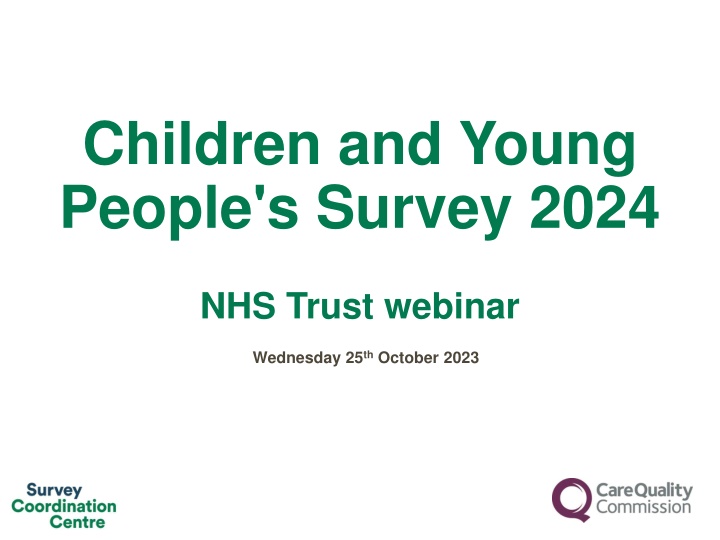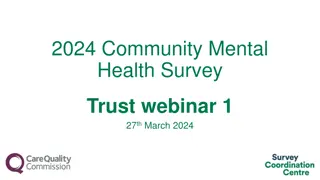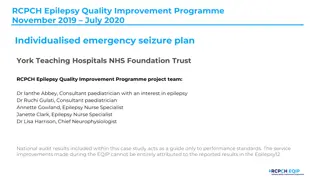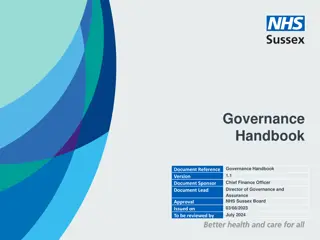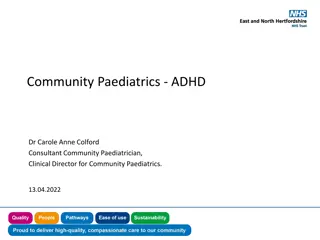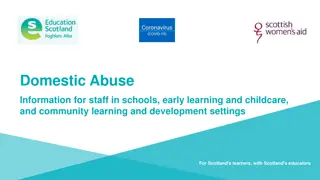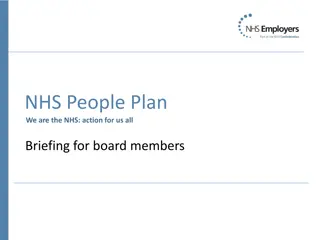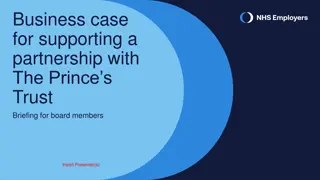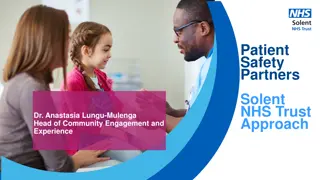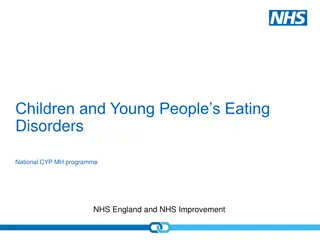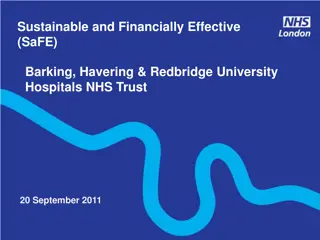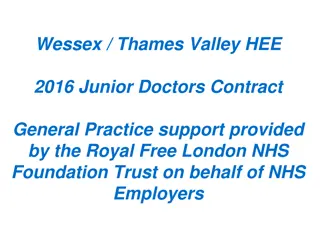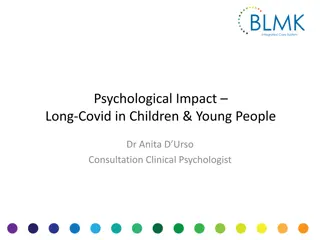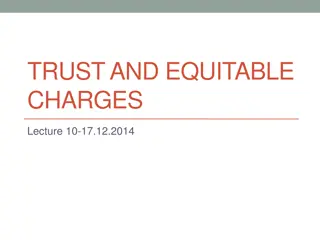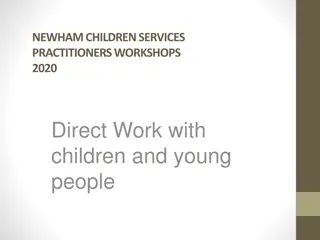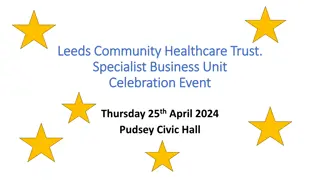Children and Young People's Survey 2024 NHS Trust Overview
The Children and Young People's Survey 2024 by NHS Trust is a crucial initiative aimed at improving healthcare quality for children and young individuals. This survey collects feedback on various aspects of patient care, covering topics like hospital experiences, operations, and pain management. Learn about the survey's significance, participants, key dates, and the roadmap for redevelopment.
Download Presentation

Please find below an Image/Link to download the presentation.
The content on the website is provided AS IS for your information and personal use only. It may not be sold, licensed, or shared on other websites without obtaining consent from the author.If you encounter any issues during the download, it is possible that the publisher has removed the file from their server.
You are allowed to download the files provided on this website for personal or commercial use, subject to the condition that they are used lawfully. All files are the property of their respective owners.
The content on the website is provided AS IS for your information and personal use only. It may not be sold, licensed, or shared on other websites without obtaining consent from the author.
E N D
Presentation Transcript
Children and Young People's Survey 2024 NHS Trust webinar Wednesday 25th October 2023 1
Agenda Overview of the Children and Young People s (CYP) Survey Questionnaire content / topic areas Eligibility criteria Data publishing Questions 2
Overview of the CYP Survey 3
What is the CYP Survey? One of the five experience surveys of the NHS Patient Survey Programme (NPSP.) Conducted every 2 years; results are crucial to improving the quality of care and experience of Children and Young people. The Care Quality Commission (CQC) uses the results to assess NHS performance and for regulatory activities. Results are also used by a range of stakeholders: NHS England Department of Health and Social Care Individual NHS trusts and commissioners o o o The most recent CYP Survey was conducted in 2020 and it is being conducted again in 2024. 4
Topics overview Admission to hospital Hospital and ward Doctors and nurses Facilities for parents and carers Operations and procedures Pain management Leaving hospital Overall 5
Who completes the CYP Survey? 0-7 8-11 12-15 Feedback provided by parents and carers Mainly children and young people, with additional feedback provided by their parents and carers. CYP2020 collected feedback on the experiences of 27,374 children and young people who received care in 125 NHS acute trusts during November 2020-January 2021. 13,261 young patients aged 8 to 15 told us directly about their experiences 6
Key dates Development phase Publication of dissent posters Early March Fieldwork (15 weeks): 1st July 10th October Sep. 2023 June 2024 CYP Workshops: Mid Oct. Stakeholder Interviews: Mid Oct. Trusts Webinar: Late October Scoping summary sent to stakeholders: Mid December Sample drawn: Early June- Early July 7
Redevelopment Roadmap 8
Background Scoping work and consultation Pilot to change survey method (mixed mode) Evaluation of relevant developments in children's health care policy Questionnaire Performance Analysis CYP Workshops Stakeholder Interviews Consultative Trust Webinar 9
New survey method OLD METHOD Paper questionnaires only all invites via mail NEW METHOD (MIXED MODE) Online questionnaire & paper questionnaire Mail & SMS invites 10
Mixed mode pilot Pilot established that the online and paper mode worked BUT needed mobile numbers to hear from more patients SMS reminders including a link to the online questionnaire have the greatest positive impact on whether someone chooses to complete the survey or not. 0-7, 8-11 and 12-15: 10% higher response when SMS reminders sent If 50% of the sample had mobile phone numbers, an appropriate response rate was achieved with just three mailings. Lower levels of mobile phone numbers, four mailings were required to achieve a comparable response rate. 11
Mobile number sharing Issues from the pilot Most trusts had numbers for most young patients. The main barrier to providing numbers was not knowing who they belonged to (parent or young person) and some concerns with potentially sending text messages to young patients Follow up engagement work Following on from this pilot we worked with the Confidentiality Advisory Group, Ethics panel, UK Caldicott Guardian Council, NHS Trust staff, children/young people and their parents/carers. . 12
Mixed mode pilot: mobile number sharing Findings of Engagement Work Ethics, CAG, UK Caldicott Guardian Council expressed no concerns for under 16 year olds to be contacted about the survey via mobile number. CAG confirmed the number was very likely to be the parents , and stated that if the number of the child had been given, that the child was sufficiently competent to receive messages from the Trust . Ethics felt that where children have the authority to make decisions, this should be respected, and therefore if their number had been provided, it had been done because they were the most appropriate person to contact. Feedback from families highlighted that a child s mobile number is unlikely to be the main contact, unless it has been agreed with their parent or carer that they are ready to take ownership of their care. 13
Mixed mode pilot: mobile number sharing Conclusion The ability of Trusts to share mobile phone numbers on the samples is vital for the success of the mixed mode methodology. The CYP survey needs mobile numbers to be available for at least 50% of the populationfor the push-to-web methodology to be successful Trusts will be asked to share mobile phone numbers regardless of who they belong to, with the following exceptions; Mobile phone numbers where the patient is a safeguarding concern The parent/carer or child/young person has dissented to the sharing of their mobile number 14
Mixed mode pilot: mobile number sharing Conclusion To help, CQC and the SCC will provide the following; Communications will be written for trusts, including information for parents who raise any complaints or concerns. These will be made available in advance of the next CYP mainstage. The questionnaire and materials are being reviewed, to ensure they were appropriate for a child if they are contacted. Sampling guidance will outline how to handle cases where it is unclear who the number belongs to, and any approaches to mitigate potential safeguarding concerns where the number belonged to a former-care giver, who was considered a safeguarding risk. 15
Eligibility Criteria 16
Eligibility Criteria Day case and inpatients, via emergency and/or planned admission routes. Day case: Admitted patients who did not stay overnight (e.g. emergency admissions and planned day cases) Inpatients: Admitted patients who stayed in hospital for at least 1 night. All eligible admitted patients discharged from trusts who were aged between 15 days and 15 years (inclusive) at the time of their discharge. 17
Exclusion Criteria New-born babies where the mother was the primary patient Patients who were only admitted to a Neonatal Intensive Care Unit (NICU) or a Special Care Baby Unit (SCBU) Obstetrics/maternity patients, including spontaneous miscarriages and planned terminations. Psychiatry patients, including CAMHS 18
Sampling The survey permits a sample size of up to 1250 patients per Trust. 450 patients aged 0 to 7 400 for those aged 8 to 11 400 for 12 to 15. When a trust is unable to achieve these targets, they were permitted to include eligible patients from any other age group to reach the total. If a trust submits less than 1250 patients, then the quotas adjust based on population data. The sampling period for CYP20 was November 2020-January 2021, whilst the sampling period for CYP24 is April- May 2024. 19
Publication and Materials 20
Dissent poster: Information sheets: 8-11 years: 12-15 years: 21
What methods does your trust use to contact and engage with CYP and their parents/guardians? Do you contact CYP and their parents together? Do you use different approaches to reach parents and CYP? Which methods do you find most effective? Are there any methods you ve tried that haven t worked?
What do you consider best practise when contacting CYP and their parents/guardians? How does context effect this? What tone works best? What needs to be avoided? 23
Questionnaire content / Topic Areas 24
Hospital Ward Survey Section Questions 0-7 years Parents/ Guardians Type of ward Ward facilities (e.g. wi-fi, food) Cleanliness Privacy Staff interaction with child Parent-child time + Hospital activities 8-15 years Parents/ Guardians Children 8-11 years Staff interaction Wi-Fi Hospital activities and food Sleep quality + Ward suitability + Hospital activities + Food 12-15 years Young People 25
Pain Management If you/ your child felt pain while you/they were in the hospital, do you think staff did everything they could to help you/them? 26
Operations and Procedures Survey Section Questions All Ages Parents Explained what would be done before the procedures Answered questions Distracted the children/young people during the procedures Explained how operations had gone. 8-15 years Children Young People Explained what would be done before the procedures Afterwards explained how operations/procedures had gone 27
Leaving Hospital Survey Section Questions 8-15 years Parents Advice and written information on how to care for child Next steps in the child s care. 0-7 years Parents + Who to contact if worried 8-15 years Children Young People Information on who to contact if worried, Next steps in care Advice on how to look after themselves. 28
Looking After You in Hospital Survey Section Questions 8-15 years Children Young People Information from staff on how they will be taken care of How well staff listened to them Ability to ask staff questions, Getting responses from queries and worries Feeling involved in decisions about their care Privacy while receiving care and treatment + Ability to talk to staff without a parent/carer being there (12 15-year-olds only) 29
Facilities Survey Section Questions 0-15 years Parents/ Guardians Access to hot drinks Facilities to prepare food Rate the facilities for parents/carers Overnight stay with their child in hospital. 30
Parents Only: Hospital Staff Survey Section Questions 0-15 years Parents/ Guardians Introducing themselves to the child Providing information about care Quality of communication Being available when the child needed attention. Involving parents in decisions about their child s care Keeping parents informed on their child s care. Agreeing on a care plan with the parent Not providing conflicting information Awareness of the child s medical history Working well together with other members of staff when caring for the child. 31
Parents Only: Admission to Hospital Survey Section Questions 0-7 years Parents/ Guardians Method of admittance (planned or an emergency) If given choice of admission dates? Changes to admission date? 32
Future topics: Transitions CYP24 aims to understand transition experiences. Several issues have been highlighted in relation to transitions from children to adult s services: Waiting time Lack of appropriate adult s services to transition onto Difference in care quality between children to adults' services 33
Admission to hospital Hospital and ward Across the survey, is it still useful to have feedback from parents/guardians and CYP on the same topics? Facilities for parents and carers Doctors and nurses Which topics are your current priority? And which topics do you prioritize less? Operations and procedures Pain management Are there any new topic areas the survey needs to explore? Leaving hospital Overall 34
Thank you for your time A copy of the slides will be shared with you via email, after the webinar. Contact us: cyp@surveycoordination.com / 01865 208127 35
